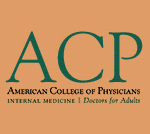by
Barbara Kram, Editor | December 11, 2007

The ACP is the
largest medical specialty
organization and the
second-largest physician
group in the
United States.
PHILADELPHIA - In a new evidence-based paper, the American College of Physicians (ACP) analyzes health care in the United States and 12 other industrialized countries and identifies lessons that could be applied to the particular political and social culture of the United States to achieve a high performing health care system, including achieving universal health insurance coverage for all Americans.
"As the nation's largest medical specialty organization, the American College of Physicians is uniquely qualified to inform the public debate and the presidential campaign about reforming the U.S. health care system," said ACP President David C. Dale, MD, FACP. "A growing number of studies by health policy experts have exposed the limitations of the U.S. health care system.
"Our recommendations provide evidence-based solutions to our country's many health care problems - including the appalling lack of access to affordable heath coverage, the impending crisis caused by the insufficient supply of primary care physicians, rising health care costs, and excessive administrative and regulatory costs."



Ad Statistics
Times Displayed: 1943
Times Visited: 9 Keep biomedical devices ready to go, so care teams can be ready to care for patients. GE HealthCare’s ReadySee™ helps overcome frustrations due to lack of network and device visibility, manual troubleshooting, and downtime.
In the paper, "Achieving a High Performance Health Care System with Universal Access: What the USA Can Learn from Other Countries," published on the Web site of ACP's flagship journal, Annals of Internal Medicine, ACP notes that spending on health care in the United States is the highest in the world and has been rising at a faster pace than spending in the rest of the economy. Yet an estimated 47 million Americans - nearly 16 percent of the population - lack health insurance protection. Even among those with health insurance coverage, wide variations exist in terms of cost, utilization, quality, and access to health care services.
Based upon the lessons learned from a review of health care systems in 12 industrialized countries, ACP makes eight recommendations to improve health care in the United States:
1. Provide universal health insurance coverage to ensure that all residents have equitable access to appropriate health care without unreasonable financial barriers. Health insurance coverage and benefits should be continuous and not dependent on place of residence or employment status. ACP calls on policymakers to consider adopting one of the following two pathways to achieve universal coverage:
*
a pluralistic system in which government entities as well as not-for-profit and private, for-profit organizations ensure universal access while allowing individuals the freedom to purchase private supplemental coverage. An advantage of a pluralistic system is that it builds on the current American approach to provision of health services. The disadvantages of this system are that it is likely to result in inequalities in coverage and higher administrative costs, both of which are features of our current system. To be successful, pluralistic financing models need to provide a legal guarantee that all individuals have access to coverage and sufficient government subsidies to pay for coverage for those who cannot otherwise afford it.

